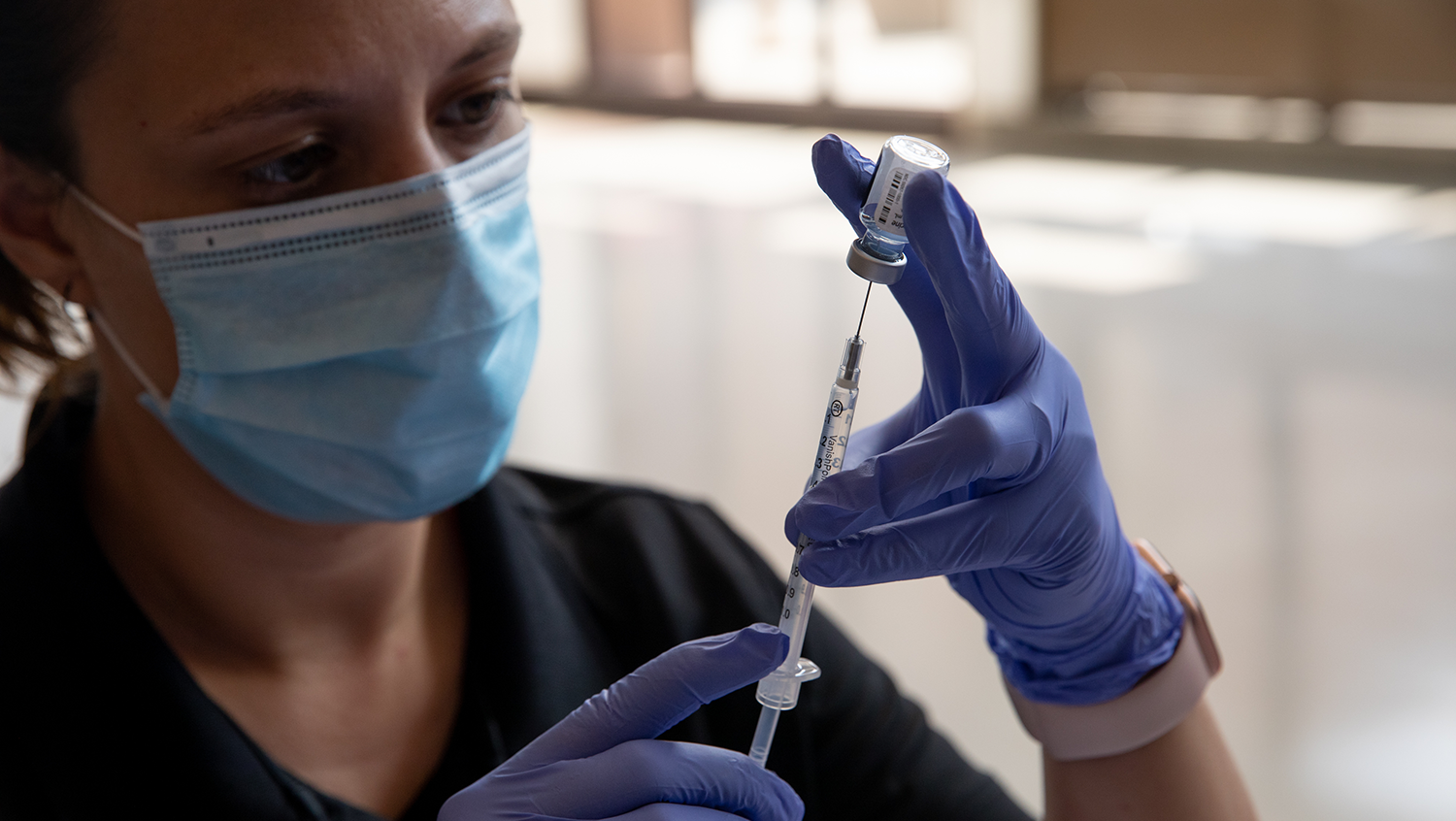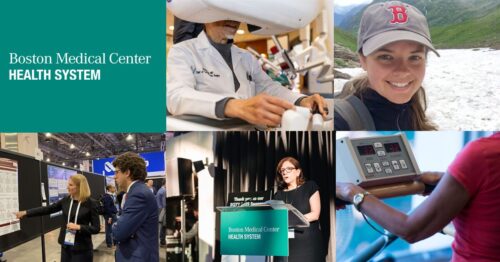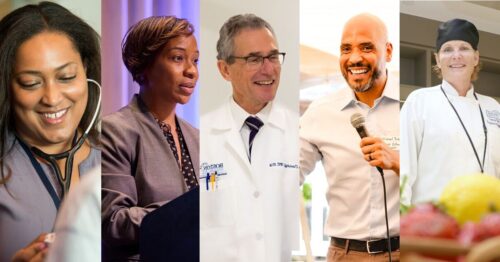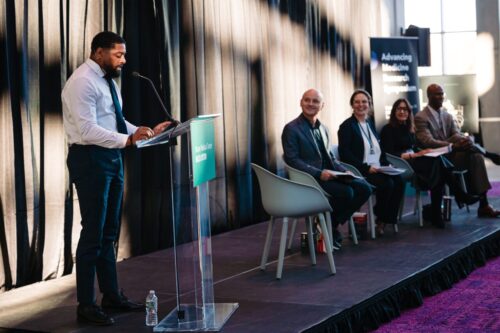Experts Offer Tips on How to Build Trust in Science During COVID-19
February 2, 2022
By Kayla Anderson, By David Limm

Emily Elconin / Getty Images
As its knowledge of the virus evolves, the scientific community must craft its messaging to combat skepticism and mistrust.
When the COVID-19 pandemic hit, infectious disease specialists, immunologists, and other medical experts from the scientific community found themselves in the spotlight, asked to play an integral part in educating and explaining public health findings and recommendations amid a global crisis.
At a time when swift communication is paramount to public safety, the scientific community’s messengers are in a challenging position of relaying rapidly evolving information about the virus to a general public largely unaware that scientific inquiry is a fluid process subject to unexpected change and debate.
Two years into the pandemic, the frequent twists and turns in public health guidance have bred confusion. What’s the latest advice on masking? How long are people supposed to isolate now? Is it safe for students to keep just 3 feet of social distance? Many people frustrated by shifting recommendations have reacted with skepticism or mistrust toward the scientific community.
Boston University’s Center for Emerging Infectious Diseases Policy and Research and the Aspen Institute’s Science & Society Program, in December, asked four prominent communication experts to explore the topic of how to build public trust in science during a time of scientific uncertainty. From Boston Medical Center, Nahid Bhadelia, MD, MALD, an infectious diseases physician; and Cassandra Pierre, MD, MPH, MSc, an associate hospital epidemiologist,joined Clint Watts, research fellow at the Foreign Policy Research Institute; and Lee McIntyre, PhD, author of The Scientific Attitude and How to Talk to a Science Denier for the discussion.
Below are useful tips and takeaways from the discussion that healthcare providers, medical professionals, and public health experts can use when engaging people who may be concerned, skeptical, or uniformed about the safety or validity of scientifically based on guidelines.
Embrace scientific uncertainty
In a pandemic, scientific uncertainty plays out in public with life-and-death stakes. People understandably become confused, said McIntyre, whose work focuses on increasing health literacy around how science works.
“Most people think science is about proof. Science is not about proof. Science is about likelihood given the evidence.” When scientists change their minds, he said, many people react with mistrust, wondering, “Were you lying then or are you lying now?”
McIntyre’s advice? “Embrace uncertainty. Explain why you’re changing your mind on the basis of evidence. Express humility.” Leaning into uncertainty only increases trust in scientists, he said. “It humanizes. It shows that you are trustworthy.”
What did McIntye say is the wrong message to put forward? “Trust is destroyed when the expert says, ‘I’m an expert, do what I say.'” While he acknowledged that few people may say it so explicitly, public-facing scientific pronouncements can often be perceived that way.
Speak in terms of probability
Even when there is a scientific consensus, someone may present a study as counterevidence. In cases like that, express data in terms of probability, McIntyre said. “The example I think of here is the person who always says, ‘Can you prove to me that climate change is real? You don’t even have 100% consensus among scientists.'”
Presenting the science on a subject as proven only invites the naysayer to return with the name of a scientist who disagrees, said McIntyre. That puts the person on the defensive. Instead, say, “We’re not a 100% certain, but it’s 1 million to 1.”
“I always get nervous when I hear language around proof and certainty, and I get happier when I hear scientists expressing language around probability and likelihood. Because that removes that moment when you have to say, ‘Whoops, we changed our minds.'”
Ask if they’re open-minded
Pandemic guidelines will continue to change based on new information on how the virus operates. How do you engage with someone who formed an opinion early in the pandemic and is stubborn to change their position as the science advances?
“Ask them whether they’re an open-minded person,” suggested Watts. “They almost always say yes. Then ask them under what circumstances they would change their opinion about masks or the vaccine. Their response tells you what you need to start to shape their perceptions.”
Watts said that the general rule in the government space is that if you can’t identify the conditions under which a person would change their mind, then that person is not open-minded and cannot be moved from their position.
Know why ‘trust in science’ is a loaded phrase
What do people mean, exactly, when they say “trust in science?” Bhadelia said that hearing the phrase makes her uncomfortable, because people may not distinguish between confidence in the scientific process and faith in scientific institutions or leaders.
“To me, ‘trust in science’ refers not to ‘trust blindly all information that scientists give you.’ It [refers] to ‘trust in the process that when a consensus has happened and an evidence base has been created, that the data in front of us, which is now supported by many different sources, is a better path forward compared to one that is based simply on belief.'”
For many people, “trust in science” is a phrase with negative connotations that conjures the historical wounds inflicted by scientists on communities of color, said Pierre. Citing obstetric science and research practices on thresholds of pain as examples of racism and violence, she said many people have wrongly suffered for science.
“Sometimes our practices are built on marginalization and trauma inflicted on others,” she said.
Choose messengers with a stake in the community
To build trust with communities who have valid reasons to be skeptical of medical systems, Pierre said that it’s crucial to select the appropriate messenger.
“Who is delivering the message, who has a stake in the health of the community, who looks like the people who are being served plays an important role in rooting and centering messages and gaining acceptance.”
Whether it’s public health officials, scientists, doctors, or local leaders, Pierre said that it’s a “powerful and beneficial thing” when messengers not only respect and listen to a community but know its barriers and share in the consequences of its outcomes.
“It’s important to understand the context and history of the community that you are speaking to,” said Pierre. “Thinking about Black and Brown communities, the toll of systemic racism is not just an artifact of Tuskegee experiments or other remote historical traumas. They are being enacted today.”
Boston University’s Center for Emerging Infectious Diseases Policy and Research (CEID) works to build societal resilience against the threat of emerging and epidemic infectious diseases worldwide. For more information on research and upcoming events, visit CEID’s website.


